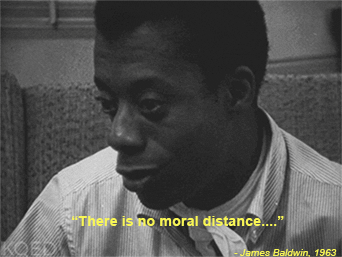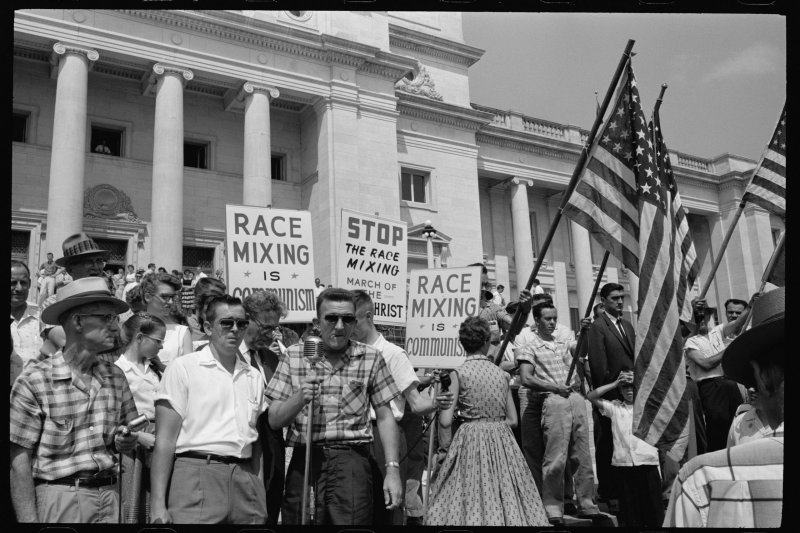‘I Am Not Your Negro’:
How Hollywood
Failed Black America
an unfinished James Baldwin manuscript,
is not only an urgent call to action,
but also one of the very best
films of the year.
Filmmaker Raoul Peck (Lumumba) went through 30 different titles before he zeroed in on I Am Not Your Negro, a defiant declaration illustrative of the work of influential author James Baldwin, whose unpublished letters form the foundation of this year’s most incendiary cinematic call to action. The title also serves as an acute distillation of how systemic racism has cultivated inequality for centuries across the black experience, hammered home in the film’s first few moments as Baldwin’s words ring over images from Ferguson as painfully accurate as they were 50 years ago.
“The first title was Remember This House, but I realized that each time I said it I would have to explain why I chose this title and where it came from,” the Haitian-born Peck told The Daily Beast during a visit to Los Angeles from Paris, where he is based. “I Am Not Your Negro says, ‘You cannot define me. I define myself.’ This was James Baldwin’s attitude his whole life: I cannot let anyone define who I am, whether I’m gay, whether I’m black, whether I’m a writer, whether I’m this or that. This is my own responsibility—to define myself. And I am not a finished product: I am always in construction because I learn, I have experience, and I see the world.”
“This is an important stand to take,” he continued, “because that’s the bottom line. You have to define yourself. And you cannot accept anybody defining you in your place.”
Peck’s Oscar-hopeful, along with Ava DuVernay’s fellow Best Documentary contender 13th, is one of the most stirring films of the year in any category. It’s a 10-year labor of love that feels as urgent as ever in today’s America. Drawing from 30 pages of an unfinished manuscript of Baldwin’s linking the lives and murders of Martin Luther King, Jr., Medgar Evers, and Malcolm X, I Am Not Your Negro also folds in shocking footage of America’s bigoted past and the ways in which white-dominated media, advertisements, and popular film dictated and reinforced the racist stereotypes that formed the nation’s idea of black existence.
At times Samuel L. Jackson, portraying Baldwin, speaks the words he wrote to his literary agent in 1979. Elsewhere, Peck invokes the power of Baldwin himself in archival footage of his transfixing orations on race and blackness in America. The film begins with Baldwin’s explanation of why, in 1957, he decided to leave Paris to return home after being confronted with images like that of 15-year-old Dorothy Counts, one of four black students harassed by racist segregationist whites in Charlotte, North Carolina, as she simply tried to go to school.
“It made me furious,” Baldwin wrote. “It filled me with both hatred and pity and it made me ashamed. Some one of us should have been there with her.”
In weaving the late Baldwin’s vital midcentury observations into his essential documentary, Peck’s film also holds a magnifying glass to everything from the triumphs and tragedies of the civil-rights movement to the new reality of Trump’s America to Hollywood’s diversity crisis—and demands that we all hold ourselves accountable for holding the powers that be accountable.
These pointedly chosen images speak volumes: Advertisements depicting stereotypical African-American caricatures eagerly serving masters, happily servicing whites; clips from films like Uncle Tom’s Cabin and King Kong that just as insidiously embedded only subservient or monstrous stereotypes of black people into the public consciousness.
“Heroes, as far as I could see, were white, and not merely because of the movies but because of the land in which I lived of which movies were merely a reflection,” said Baldwin of the images he grew up watching at the movies. In black-and-white footage from a 1965 Cambridge University debate, he explains the toll that underrepresentation in pop culture has on the self-image and self-worth of a minority child who never sees themselves reflected onscreen. It’s as incisive an argument as you’ll find for why inclusion and diversity in film and television is still so necessary today.
“It comes as a great shock, around the age of 5 or 6 or 7, to discover Gary Cooper killing off the Indians, when you were rooting for Gary Cooper, that the Indians were you,” said Baldwin. “It comes as a great shock to discover that the country which is your birthplace, and to which you owe your life and your identity, has not, in its whole system of reality, evolved any place for you.”
For Peck, Baldwin became a literary and intellectual constant from the moment he first read him as a teenager searching for validation of his own identity. “At the time for a young black boy there was not much you could read,” he said. “I read the French literature classics, American classics, and I could never find myself through that. Baldwin somehow was the first person to put out a universal approach that at the same time was very personal to me. And at the same time I think he helped nurture me in terms of intellect, helped me understand who I was and what world I was living in, and I came back to it all my life.”
The prolific director, whose films include 2000’s biopic Lumumba and the 2013 documentary Fatal Assistance, was working on I Am Not Your Negrowhen civil unrest erupted over the police killings of black men in America. He sent a crew to Ferguson to film, knowing that what was happening in the Black Lives Matter movement was intrinsically linked to Baldwin’s still-relevant writings on race.
But while the Black Lives Matter movement and more recent post-election protests across America have demonstrated a new mobilization against institutional authority, Peck observed that awareness is only the first step.

“I hope the film also underlines that anger alone is not sufficient,” he said. “You have to organize. And organizing is not just organizing one protest. You have to organize for the long-term, not just one event or one year. You have to make sure you’re in for the long run—and this is what’s lacking, what the prior generation was not able to do because most of its leadership was either killed, in prison, or in exile. And now we have this new generation that don’t have the benefit of their experience, and they have to learn again and find adapted ways to fight today.”
“Frankly, I’m not afraid of whatever Donald Trump will do or not do, because the system is so fake and so heavy that it’s not that easy to do whatever you want,” Peck said. “He will do damage, that’s for sure. But at the same time the system itself has its own contradictions.”
“We can see how eight years of Obama have been. It has been a permanent negotiation where he had to let go of a lot of what he wanted to do,” he continued. “People were energized by his candidacy and once he was elected, everyone went home—instead of keeping on the pressure. Put 500,000 people on the street and you will have a better Obamacare. It’s about pressure, it’s about showing your strength, it’s about working and organizing. But we use the election or the capacity to vote as a consumer product: You vote and then you go home and let the guy handle it.”
Continued engagement—and a concerted effort to put pressure on the gatekeepers of power, whether in American politics or in the offices of studio executives in Hollywood—are essential if change is to be made, he said.
“If I was a cynic I would just stay at home and drink whiskey and watch the Kardashians on the TV,” he laughed. “No, it’s part of what life is. What society is. What civic engagement is. People sometimes ask you if you’re a pessimist or an optimist. I never considered that question because I have no choice: It’s either I die in the picture or I fight, and for me very early on in my life I knew that I didn’t want to die dumb. I want to die with my eyes open, and to understand what’s going on around me.”
“You have to deal with the reality you have in front of you. That’s what Baldwin said: Open your eyes and deal with the reality. Don’t lose time trying to find excuses. Look at it, face it, and deal with it.”
Finding himself in the Oscar conversation in a year seemingly more progressive than the 2015 dominated by #OscarsSoWhite, he points out that if the entertainment business is to change in the direction of more diverse casts and stories and talent, organization must also happen—by those who are not part of the white-dominated power elite.
“Baldwin totally deconstructed Hollywood. And fundamentally, nothing has changed,” said Peck. “Sometimes you even have black artists who just reproduce those clichés themselves because the conversation did not go very far and it stayed superficial, and for good reason. What people don’t want to discuss—and it’s what Baldwin also said—is that it’s about power.”
“It’s not about race. It’s about power. And as long as blacks, women, gays, Native Americans, Asians, don’t have access to that power, nothing will really, fundamentally, change,” he continued. “That’s why we are having these discussions on and on again. That’s the game. That’s another way to lose time—unnecessary conversations on the surface. Once every culture has the power to make its own stories, there is no problem anymore. But they keep it so well-guarded. ‘You can be a development executive, you can be this or that, but I will give the green-light.’ You will not.”
I Am Not Your Negro connects the dots between the imbalance of representation depicted in mass entertainment with the political repression of minorities. It is a startling portrait of why inclusion matters, and why erasure of non-white faces at the multiplex and on TV screens can be damaging, not just insulting.
“It’s like Baldwin says: You’re not obliged to see the other side,” said Peck. “That’s what people today very hastily call white privilege. You don’t have to see it because you’re not the one who is suffering from it. So I don’t think it will come from them. It will come from the pressure we succeed in putting on them, and on the structure itself. That means organizing. It will not come individually; it will be a collective—and by the way, black and white, because they’re all allies. I’m not saying because you’re white you don’t understand it. I see people very shaken by the film, black and white, and that’s one of the things the film does. It faces you, and either you look at it or you don’t look at all. But you can’t be innocent anymore.”
“I think that’s where we are now: Nobody can say they don’t know. In today’s world if you don’t know, it’s because you don’t want to know,” he concluded. “And if you don’t understand that the future of this country relies on everybody, even if you think you’re going to keep your privilege, you’re just going faster into the hole.”


